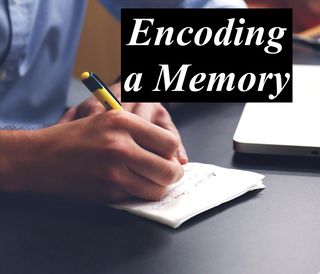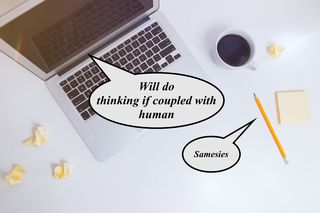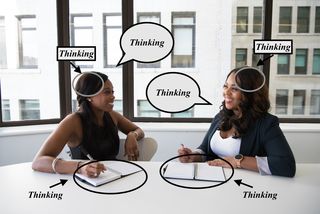Cognition
Extended Thinking
Can thinking take place beyond the head?
Posted October 19, 2019 Reviewed by Gary Drevitch

Otto has Alzheimer's disorder, and he can’t remember things very well. To get around, he keeps a notebook in his back pocket. When he wants to figure out how to get to his favorite lunch spot, he just pulls out his notebook and looks up where it’s written down. He’s been doing this for years, and he can navigate his daily life successfully. When something comes up that he would need to remember, he just pulls out his notebook, which has the important details of his life written down in an easy-to-access way.
Otto is not a real person. He’s part of a thought experiment by philosophers Andy Clark and David Chalmers.
Otto looking up the location of his favorite restaurant in his notebook, Clark and Chalmers argue, is comparable to a person without a memory disorder pulling the location out of their memory. If we ask, "Does Otto know where his favorite restaurant is?” we might be tempted to say, "No, he just has it written down.” But imagine asking yourself the same question. If you can’t just immediately rattle off the location—if you had to “look it up” in your own memory—then how different is your process of memory retrieval from Otto’s? In a sense, Otto knows (or believes) something that is external to his brain: where his favorite restaurant is.
The notebook plays the same central, important role in Otto’s life that a memory plays in yours or mine. Whenever something comes up that I need to remember, I turn inward to recall it; Otto just turns outward. The famous example of Otto’s notebook is central to the Extended Mind Hypothesis, which rests on the Parity Principle:
“If, as we confront some task, a part of the world functions as a process which, were it done in the head, we would have no hesitation in recognizing as part of the cognitive process, then that part of the world is … part of the cognitive process.” (Clark and Chalmers, 1998)
The Extended Mind Hypothesis is controversial, and not all philosophers are on board with it. But it is a puzzle I have returned to many times since first reading about in graduate school, because it forces me to consider what thinking (a “cognitive process”) really is. This idea is especially important given the way technology has increasingly come to be enmeshed in our lives.

Do I know my sister’s phone number? Well, if I need it, I can quickly and easily access it in my phone. But if I didn’t have my phone with me, I couldn’t. Do I know how to get to all of my favorite restaurants? Some I could navigate to on my own, but for many, I still rely on an app giving me directions on my phone. Do I know who the thirteenth President of the United States was? In less time that it would take me to even remember what I ate for breakfast this morning, I was able to retrieve from my “electronic memory” the name Millard Fillmore.
Taking the idea of the Extended Mind seriously requires me to consider what the important features of thinking are, besides just the fact that something happened in the brain. It suggests to me that good thinking is not necessarily about being able to hold and manipulate lots of things in your head; good thinking is skillful navigation of the world around you, using all the resources available to you.
Not being able to think means not being able to find the information you need, not being able to make a good decision, not being able to complete the task in front of you. Writing a grocery list is an act of externalizing your memory. Not remembering your grocery list is the same as not remembering what you were going to cook this week when you’re standing in the supermarket aisle. They are both acts of forgetting.
The implications of this radical reconceptualization have only begun to be explored in my own field of social psychology. Unlike cognitive psychology, which tends to focus on largely solitary, internal processes, social psychology emphasizes interactions. Applying Extended Mind ideas to social interactions, we can suddenly consider other people as part of our own thinking.

For example, consider a husband and wife who each tend to remember different things. He remembers their children’s birthdays, and she remembers which bills are due. In this scenario, they have become part of each other’s thinking process. She skillfully accesses information about her children’s birthday by asking her husband, who is easily accessible. He skillfully accesses information about the family’s bills by asking his wife. Together, they share a memory.
What if your decisions about where to go to eat were offloaded to your group of friends, so that the entire cognitive process that you would otherwise do in your head—thinking about different restaurants, weighing their pros and cons, ultimately deciding what your preferred—were done at the level of the social group? Actually, I think I’ve done that bit of group thinking before.
What if your preferences were distributed among other people, so that the opinions you form of others was determined through collective thinking with a group of existing friends. When two friends meet a new person, one might ask the other, "What do we think of her?” and all the processes of judgment that would have otherwise gone on inside the head—reflecting on the conversation, trying to draw inferences about what kind of person she was in other contexts—would take place outside the head in the conversation. Collective problem solving has already begun to be explored in a research literature on collective intelligence.
More broadly, these examples suggest that we need to be more mindful of context when studying people. Thinking takes place through skillful interaction with the environment, which includes the people we spend time with. Accomplishing any particular task can usually be done in multiple ways, and figuring out how to solve it can involve creativity and adaptability—including the flexible distribution of parts of the task across objects and the minds of other people. Understanding the situation a person finds themselves in—and all the opportunities and challenges it affords—is integral to understanding good thinking.




